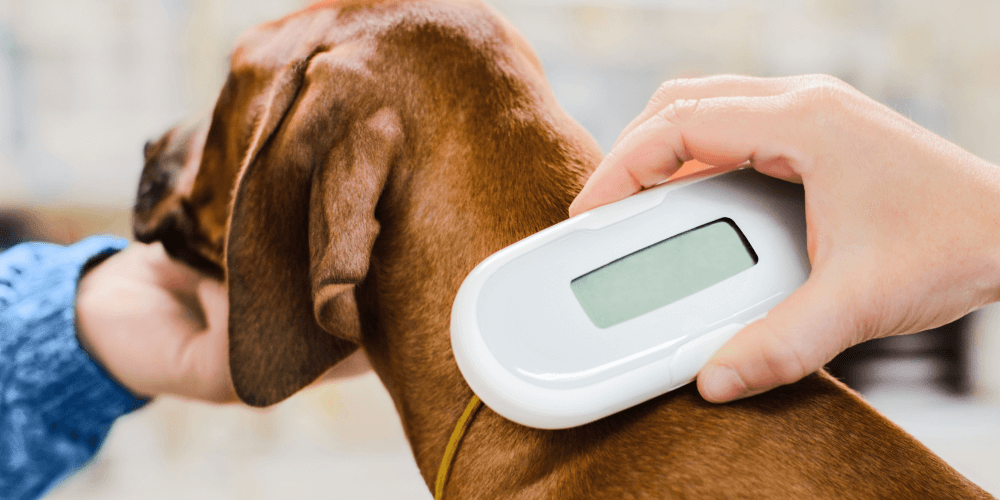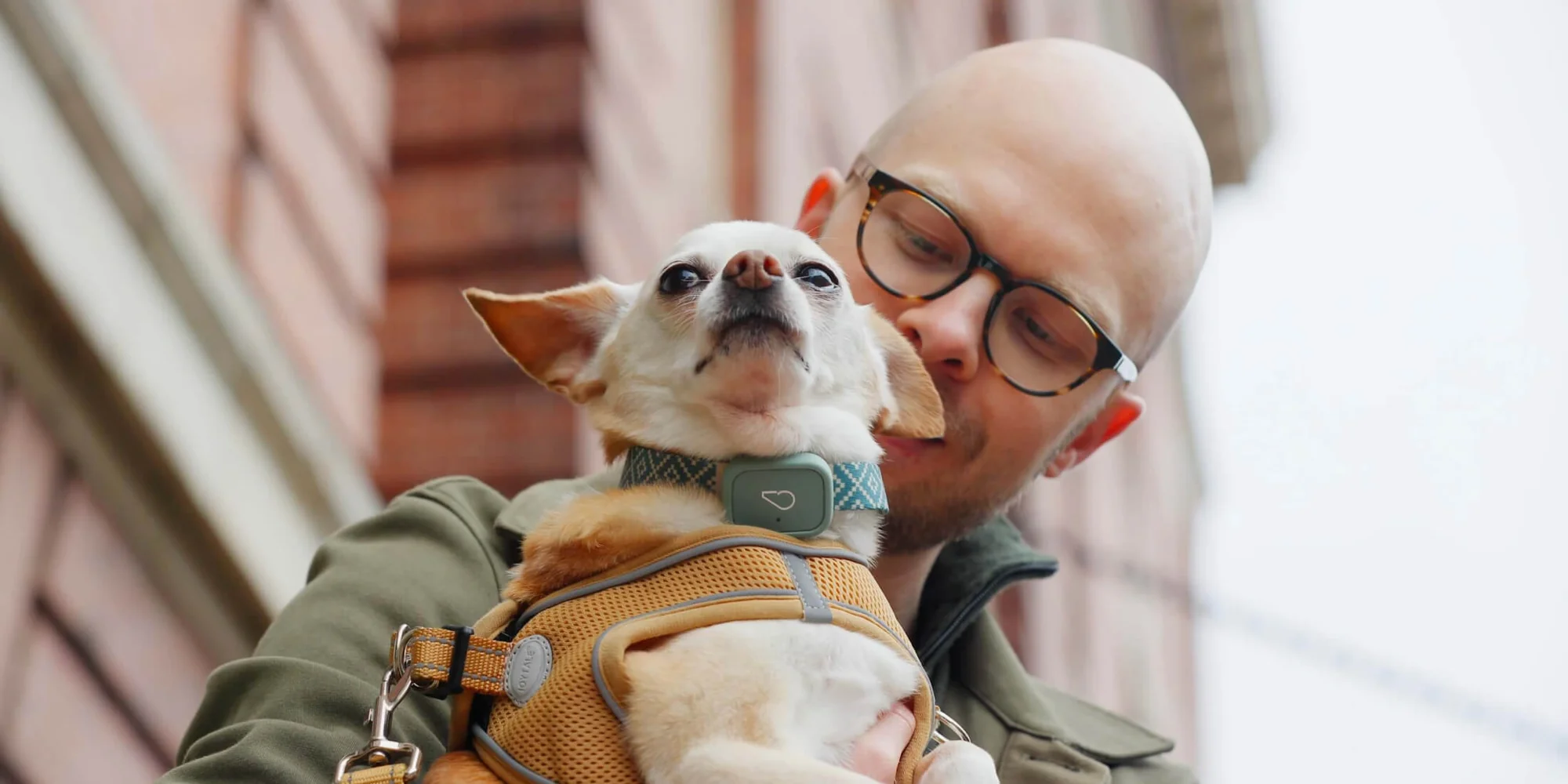9 reasons to buy a dog GPS tracker
Remember when smartphones and smartwatches seemed like nice-to-have—but not essential—gadgets and now you can’t imagine life without them. That’s exactly how pet parents feel about dog GPS trackers.
An estimated 10 million pets go missing every year in the United States and a GPS tracker like Whistle Go Explore 2.0 and Switch Smart Collar lets you track lost pets, pinpointing their exact location on a map but GPS trackers also do a whole lot more.
What is a GPS tracker for Dogs?
A global positioning system (GPS) sends and receives signals to a network of satellites to pinpoint the specific location of an object. GPS trackers can provide information about latitude and longitude.
How Does GPS Tracking Work for Dogs?
GPS devices are small enough to be attached to your dog’s collar and use information from satellites to pinpoint your four-legged friend’s exact location. The information is relayed to your mobile device via an app and allows you to track your dog’s movements.
What is the Best Tracking Device for Dogs?
Microchips offer permanent identification but don’t allow you to track your dog. GPS dog collars are a superior choice for tracking a lost dog. Whistle Go Explore 2.0 and Switch Smart Collar have GPS tracking capabilities that let you know exactly where your pet is at all times.
Thanks to GPS powered by AT&T’s 4G LTE network, the smart devices provide 24/7 tracking and will work anywhere there is a cell phone signal—even if there is no one else around for miles. Find My Pet mode provides location updates every 15 seconds, allowing you to track lost pets in real time, pinpointing their exact location on a map.
Whistle devices can also prevent pets from getting lost. Go Explore 2.0 and Switch Smart Collar allow you to set up “safe places” like your home, doggie daycare or your favorite boarding facility and will send location alerts via push notification, email or text if your dog leaves their designated safe space.
These real time notifications could make the difference between getting a lost or escaped pet to safety quickly and spending countless stressful hours wandering neighborhoods, hanging up “Lost Pet” signs and calling their name in the hopes of reuniting with your lost pet.
How Much is a GPS Tracker for Dogs?
The cost of GPS dog trackers varies. The upfront cost for the tracker can range from $20 to $200 and most companies charge a subscription fee to connect to the cellular service that provides real time GPS tracking updates. The fees can be around $100 per year (and can often be paid in monthly installments).
9 Reasons to Buy a Dog GPS Tracker for Dogs
GPS trackers do so much more than track lost pets in real time. Here are nine reasons your dog needs a GPS tracker.
1. It’s not the same as microchipping your dog.
Getting your pet microchipped is a great first step in keeping them safe, but it’s important to know the difference between a microchip and GPS for dogs.
A microchip can only help your pet find their way back to you if they’re brought into a vet or shelter that can read that chip—and even then, only if your information is kept up to date. A dog GPS tracker is more proactive; Whistle Go Explore 2.0 and Whistle Switch Smart Collar will alert you if your pet gets out of their safe zone and provide location updates every 15 seconds, which means that you have a better chance of getting your lost dog home quickly.
2. It doubles as a fitness tracker to make sure your pup is getting all the exercise they need.
Just like your own activity tracker might help you stay on track, a dog activity tracker for your dog will help your best friend get the exercise they need. Dog GPS trackers log your dog’s steps and help you spot patterns between their activity and other important details (like if your puppy tends to get into trouble on days when they aren’t getting enough exercise). Plus, Whistle trackers will give you an in-app nudge when your pet is close to their fitness goals but hasn’t quite hit them. Your pet can earn badges for achieving certain goals. Hey, we can all use some encouragement.
3. It makes feeding your dog the right amount of calories basically foolproof.
Dog nutrition doesn’t have to be confusing. Whistle trackers can give you a tailored recommendation based on how many calories your dog is actually burning, which, as you probably know, can fluctuate. If summer is nonstop-hiking season for your pet but winter tends to be quieter, you’ll have help making the right adjustments to their portions to make sure you’re meeting your dog’s nutritional needs.
4. It can offer peace of mind—no matter how sneaky your pet is.
Hard as you try to reinforce fences or carefully squeeze yourself in and out of your front door, some dogs are just bonafide escape artists. Or maybe your pet is typically a homebody, but they get especially nervous in unfamiliar settings, like when you take a road trip. For these situations, and so many more, dog GPS trackers offer additional peace of mind.
Whistle Go Explore 2.0 gives you location tracking plus the ability to set up geofencing. Any time your pet leaves the geofenced area, you’ll get an alert—so you’ll always know when your pet is on the move.
5. And it even helps you keep track of your dog in the dark.
Winter’s shorter days probably mean early morning and nighttime walks are in your future. Whistle Go Explore 2.0 has a built-in night light so that you—and any cars going by—can spot your pup.
If you’re trying to find your pet after dark, you can turn on the night light from your mobile phone. The light can flash fast, slow or stay on continuously, depending on what you need and it turns off automatically after 30 minutes, so you won’t run the battery down if you forget to turn it off.
6. You’ll know when and where your pup goes for a walk—even when you’re not there.
Ever wonder where the dog walker takes your pup when you’re not home? Are they getting in some solid steps and sniffs? With a dog GPS tracker, you’ll get to see when and where your dog goes, even when you’re not the one walking them. And if you have a particularly rambunctious pet, you’ll have location tracking should they outwit the dog walker and head out on a solo adventure.
7. Some dog GPS trackers even offer health monitoring in addition to location tracking.
Not all dog GPS trackers provide health monitoring. But Whistle Go Explore 2.0 combines the best of both worlds to track your pet’s location as well as several important health markers—like licking, scratching, sleeping, and drinking.
Sometimes it’s easy to notice when your dog’s habits have changed, and other times it’s a lot harder—especially if you’re not home all day. Is your dog really scratching more, or are you just imagining it? Do they have a newfound obsession with licking parts of their body, or were you just super focused on how cute they were before? Maybe you’re concerned your pet isn’t getting enough sleep at night or is slower to get through their water bowl.
Whistle trackers help you monitor these activities so you’ve got hard data to back up your hunches. You can look at your pet’s behavior on a weekly or monthly basis to see how things have changed over time, and you’ll get an alert when the tracker notices differences in your pet—so you can rest a little easier.
8. All of this means that you’ll have more data to share with your vet.
Life is busy, and sometimes it’s hard to remember the small details about your dog’s habits when it comes time for their check-up. Have they been licking more or less? Drinking more or less? Small changes can really matter when it comes to early disease detection.
Whistle trackers monitor these crucial details to make it easier to update your veterinarian. In the app, you can email a 30-day report directly to them in a tap. We’re not sure if your vet hands out awards, but you probably deserve at least a nod as Pet Owner of the Year for that.
9. And if you have more questions, you can chat with a vet from the Whistle app.
Life is busy, and sometimes it’s hard to remember the small details about your dog’s habits when it comes time for their check-up. Have they been licking more or less? Drinking more or less? Small changes can really matter when it comes to early disease detection.
Whistle trackers monitor these crucial details to make it easier to update your veterinarian. In the app, you can email a 30-day report directly to them in a tap. We’re not sure if your vet hands out awards, but you probably deserve at least a nod as Pet Owner of the Year for that.
And if you have more questions, you can chat with a vet from the Whistle app.
OK, so this one is specific to Whistle trackers, but we think it’s worth mentioning. With a Whistle GPS tracker, you’ll also have access to virtual vet support when you need it most—like when you need to know if that thing they just ate or pooped is no big deal or a very big deal.
Know someone who could really use a dog GPS tracker in their life? Buy a Whistle tracker for the pet parents on your list, or share this post as a not-so-subtle-hint to the gift givers in your life.
--









